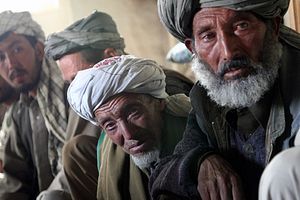A nightmare is coming true: Afghanistan is falling into sectarian war.
On July 22, 2016 twin suicide bombers attacked a rally of the Shiite Hazara community, taking the lives of more than 80 people. More than 250 were injured. In November 2016, a suicide attacker targeted a Shiite mosque in Kabul, killing 27 members of the Shiite Hazara community. On June 6, 2017 in an attack on Herat Jamma Masjid, seven Shiite Hazaras were killed by a suicide bomber. On August 2, in the same city, a suicide attack blew up a Shiite mosque, claiming the lives of 29 worshipers. Islamic State’s Khorasan Province (the group’s outfit in South Asia) claimed responsibility for each of these attacks.
The Taliban, a Sunni religious group, so far has attacked the citizens of Afghanistan regardless of their sectarian beliefs. However, in recent months their bombings and suicide attacks have also been concentrated on the Shiite populated areas of Kabul, the capital. In a more recent attack on August 5, 2017, the Taliban and ISIS teamed up and took control of a village in Sar-e Pul province inhabited by the Shiite Hazaras. According to official reports the militants have slaughtered at least 60 men, women, and children and took more than 150 families as hostages. At the time of this writing, 235 hostages have been released, after mediation by a neighboring village’s elders, but around 80 are still captives.
Sectarian confrontations in Afghanistan have never escalated to open fighting. Governments run by the dominant group have a long history of discriminating against the minority Shiites, but the latter never took up arms. The government put strict restrictions on Shiite gatherings in the years prior to the 1979 pro-communist revolutions. Many of prominent Shiite religious leaders were imprisoned or eliminated by the then King Zahir Shah and his government. Under the king, the Shiites of Kabul were forced to hold their religious gatherings secretly, in the basements of their homes.
However, the civil wars of the 1990s were charged by ethnic resentments, and many times Shiite and Sunni groups joined each other in fighting another united group combining the two religious sects. From 1992 to 1995, for example, the Shiite Hazara faction, Hezb-e-Wahdat (Unity Party), joined the Hezb-e-Islami (Islamic Party), an exclusively Sunni faction, in fighting against Jamiat Islami, a predominantly Sunni party that was in coalition with Harakat-e-Islami, a Shiite party. This led Abdul Ali Mazari, the leader of Wahdat party to famously conclude that “in Afghanistan slogans are based on sectarianism but actions are ethnically charged.”
That trend, however, is changing and Afghanistan — a country that has long suffered from ethnically charged wars — is becoming a battleground for sectarian war. The defeat of ISIS in Iraq and Syria will see the defeated fighters pour into Afghanistan, along with their sectarian agenda. With the inflow of ISIS fighters from Iraq and Syria, the already established ISIS branch in Afghanistan is empowered. So far, the Shiites have not retaliated; however, it’s possible that after the Syrian regime and Iran no longer need the recruited Afghan Shiite militia to combat ISIS, these fighters would return too. With their return, retaliation is likely to happen.
The Taliban and ISIS have little differences in their fundamental beliefs. Both groups want to rule their subjects according to Islamic traditions or Sharia laws. However, the Taliban is not only a religious group, but a Pashtun nationalist group too. Thus, unlike their ISIS peers they have not claimed to establish a transnational caliphate, but only an Afghan emirate. This minor difference and the initial clashes between the Taliban and ISIS in eastern Afghanistan have led the Afghan government, international supporters of the Afghan state, and commentators to think that the two groups cannot team up together. That assumption misses the point that their ideological similarities, helped by the same sources of funding, Arab elites in the Gulf countries, would bring them together eventually. The Taliban leaders well understand that in cooperating with ISIS they would receive more funds from their Arab patrons. Also, should both groups succeed in taking control of the whole Afghanistan and overrunning President Ashraf Ghani’s government in the future, being the indigenous faction, the Taliban outmuscle ISIS. Rationally, the Taliban would take the help offered by ISIS to overthrow the government.
Thanks to this unholy alliance, Afghan Shiites and ethnic Hazaras would be in danger of massacres and even annihilation. The Shiite government of Iran in the past has shown little interest in supporting Shiite groups in Afghanistan (unlike its support for the Shiites of Iraq). No significant Shiite religious site or pilgrimage is located in Afghanistan to compel the Iranian government to step in and assist Afghan Shiites; instead Iran, seeking to undercut American influence, has secretly helped the Sunni Taliban.
To combat growing sectarian conflicts, the Afghan government first needs to take strict measures to lessen and reduce the spread of madrasas, religious schools. One area which the two rival religious states, Saudi Arabia and Iran, compete is in establishing madrasas. Regulating madrasas would help the government to avoid the influence of these two rivals and their sectarian enmity. Second, the government needs to take strict measures against those Shiite and Sunni clerics who are spreading religious hatred openly in mosques. Third, the government should create a special security force to guard the areas inhabited by Shiites and protect their places of worship.
Though corruptions and divisions inside the government are undercutting its functions, sectarian conflicts can still be avoided if the authorities fight back in a timely and strategic manner.
Rustam Ali Seerat is a research scholar at the South Asian University, department of International Relations.
































